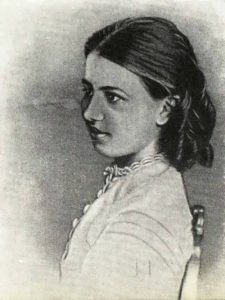Sofia Kovalevskaya (whose name is sometimes written as Sonia Kovalevsky, due to the vagaries of transcription) said that “it is impossible to be a mathematician without also having the soul of a poet”. A very beautiful sentence, where the idea of poet is taken in the etymological sense (from the Greek poietés): a creator, a creative spirit. Sofia complained that many people confuse mathematics with elementary arithmetic calculations, thinking that it is a skill that doesn’t require imagination. Such people have not had the good fortune to experience the play of the great mathematical concepts, the intellectual, creative freedom that is manifested in the development of the various branches of this science. But in fact, as d’Alembert said in his Introductory Discourse to the Encyclopédie, Archimedes is the one who most deserves to stand next to Homer among the great Greek creators.

For Kovalevskaya, the idea that the true mathematician is a poet also served to explain to her friends how it was possible for her to devote her time to literature, and at the same time to excel in mathematics and be the first woman university professor in Europe (in Stockholm, to be precise).
In fact, among 19th century German mathematicians, the idea that to mathematise is to poeticise had become commonplace. Kovalevskaya attributes it to her teacher and friend Weierstrass, but we also find it in Pringsheim, and long before all that in Jacobi… whose source is the poet Novalis (Baron Friedrich von Hardenberg, 1772-1801). Let me tell you about the latter.
Jacob Jacobi was not only the great specialist in elliptic functions, number theory, differential equations and classical mechanics. The young C. G. J. Jacobi was a true philosopher, i.e. he had very broad interests, historical and philological, philosophical, mathematical and scientific. Like Gauss, he hesitated a long time between devoting himself entirely to philology or mathematics. In 1825 he defended his doctoral thesis, for which he had to present several “theses”: ideas to defend in a disputatio. Several of the theses were mathematical, one was philological, and another one said: “The poet Novalis states magnificently: The concept of mathematics is the concept of science in general. All sciences must strive to be mathematical.”
But Novalis had gone much further in his romantic enthusiasm for mathematics: “The life of the gods is mathematical. Divine envoys must be mathematicians”. And of course, a great poet like him saw himself as an envoy: “Poems are glimpses of divinity on earth. Will it be the same with theorems?” He would not be the last poet to find an endless field of reflections in mathematical ideas. (Jacobi quotes this last sentence of Novalis’, approvingly, in a letter to his brother.)
Sofia’s sister, A. C. Leffler, Duchess of Cajanello, wrote a biography of her in which she says (p. 163): “It was for her an endless source of affliction which in this world “we can only see in part, and only partially know”. And so she loved to dream of another, higher life, of which the apostle says so beautifully: “now we see through a glass darkly, but then we shall see face to face”. To perceive unity in multiplicity was the aim of her scientific and poetic mind.” Unity in the multiplicity: the subject of set theory… but this would be a subject for another post.

Leave a Reply